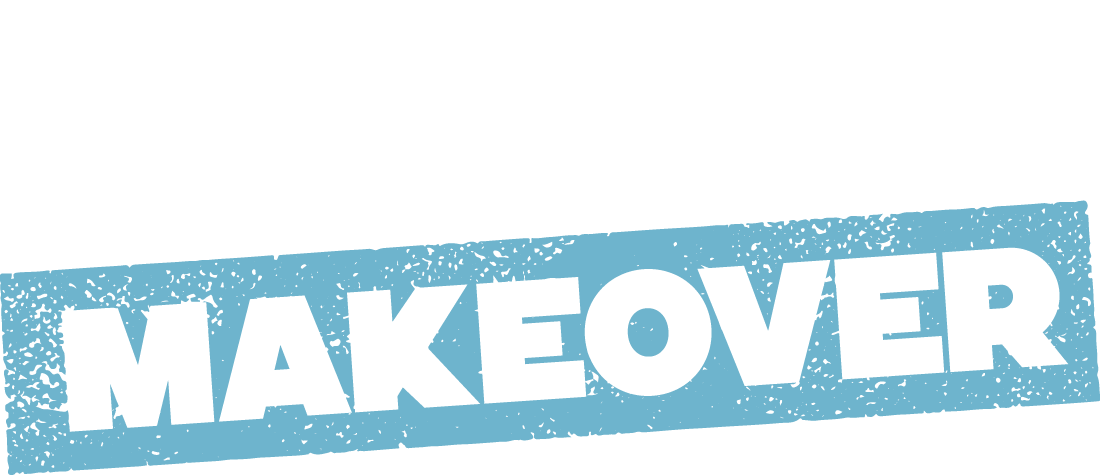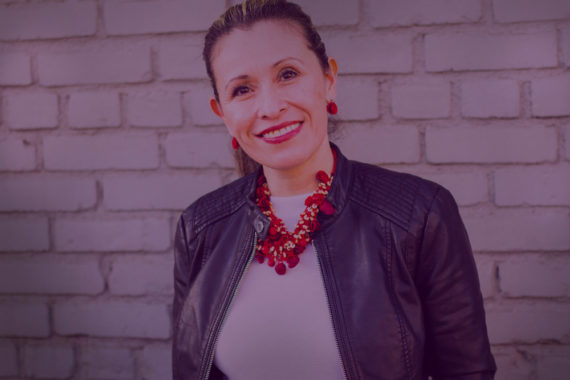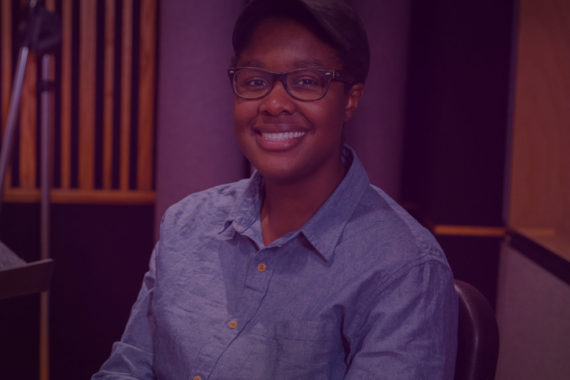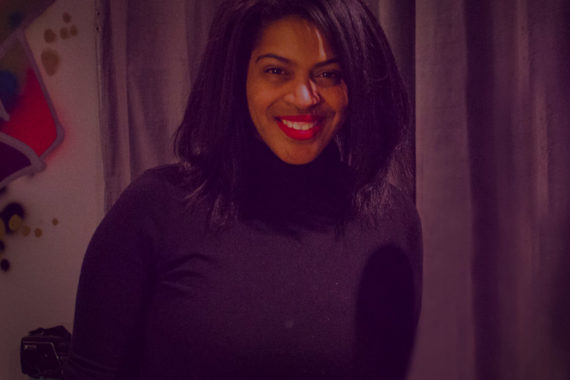
Jean Miller Truelson, Creator of Flower
(photo credit: Sandra Garcia)
Natalia and Gina get the 60-second pitch from Jean Miller Truelson of Flower, a support app that functions like a registry for friends in need, whether they’ve just had a baby, have recently become ill, or simply need extra support. In the Legal Minute, Mitzi Chang of Goodwin on how to vet a cofounder. Plus, this week’s Investor Take from Ruth Ann Harnisch of The Harnisch Foundation. This is the last episode of Season 1. Stay tuned for Season 2!
Music courtesy of Seven Seas Music (a Pipeline Angels portfolio company!)
EPISODE TRANSCRIPT
* indicates emphasis
Natalia: Hi everyone, my name is Natalia Oberti Noguera. I am the Host and Creator of Pitch Makeover and I’m also the founder and CEO of Pipeline Angels, where we are changing the face of angel investing and creating capital for women and non-binary femme social entrepreneurs.
Gina: And I’m Gina Delvac, the founding Executive Producer of Pitch Makeover. We’re taking the concept of a fashion makeover and applying it to startup pitches. Entrepreneurs pitch, we talk, and then we share some feedback on what they should keep, delete, and maybe even more important—add to their pitch. Our goal: help more voices—as Rihanna says—shine bright like the diamonds that they are.
And after the Pitch Makeover we have the Legal Minute with Mitzi Chang of Goodwin answering burning startup legal questions, followed by First Pitch, and stay to the end for this week’s Investor Take from Ruth Ann Harnisch of The Harnisch Foundation.
[1:00] Welcome back to Pitch Makeover, I’m Producer and this week’s co-host Gina Delvac, here with Natalia Oberti Noguera. Hi, Natalia!
Natalia: Hey, Gina!
Gina: And we’re here with another wonderful founder, Jean Miller Truelson who is the founder of Dogpatch Tech which is the creator of Flower. Hi, Jean!
Jean: Hi!
Gina: Are you ready for your one minute pitch?
Jean: I’m ready.
Gina: Ready? Set? Pitch!
Jean: Have you ever wanted to help a friend? Maybe they just had a baby. Or are recovering from surgery. Or maybe they recently became sick. It’s tough when you have your work, your family, and no time. Normally we say, “Let me know if I can help,” but that rarely happens because it puts the burden on the person in need and most of us hate asking for help. Nobody can get through life’s challenges alone, so we created a better solution: Flower, a support app to help those we love. [2:00] We have big features coming soon, so check us out at flowerapp.com or search for “SupportFlower” and come help us build the best support platform out there.
So, the next time life happens and you find yourself asking, “How can I help?” Instead, send a Flower.
Gina: Fifty-nine seconds.
Natalia: Jean, you’re saying that, you know, Flower is a support app. Talk to us about what does support mean? What industry is it? Caregiving?
Jean: It kind of crosses industries, actually, between caregiving and health, and I generally refer to it as a support app. But to give you an example of how it works, it’s similar to a wedding registry. Most – a wedding registry is set up so that friends can come in and give gifts. Flower is similar in the sense that someone can set up a Flower and come in and give help to the person that they care about. [3:00] So, we tend to cross the lines around caregiving, and health, and support because it’s social support as well.
Natalia: How big is—you know, are those industries?
Jean: Caregiving? Gosh! I mean there are millions of caregivers all over the world, not only in the U.S. About sixty-one million, if I remember correctly. And, that’s just caregiving alone. Flower can help: new parents; also new refugees as they come into the country; disaster relief, there are over a hundred thousand families across the U.S. that need disaster relief services every year, and that’s minimally. So we’ve been actually looking at different avenues in which support is needed and people don’t know how to ask, and they don’t know how to start. And we’ve been speaking to organizations that can provide that support and want to use Flower.
Natalia: [4:00] So, are you ready for your Pitch Makeover?
Jean: Yes? [Both laugh.]
Natalia: So I say, you did such a great job at answering the why. Why do we need Flower? You stated the problem: there’s no time, most people hate asking for help, and you made it easy to understand why someone would want Flower. So, in terms of your Pitch Makeover, let’s start with what you should keep. I loved how you started with a question. You know? Like, helping a friend. Because it made it feel approachable. So, keep how you—the intro. Keep the explanation on *why* Flower is needed. You know: lack of time, people finding it difficult to ask for help. Keep the part about how it’s a support app that, you know, is helping those people.
In terms of delete: even though [5:00] Gina says that it was fifty-nine seconds, I still feel like we can squeeze in a little bit more just because you did a great job at taking your time, however you’re not always going to be able to be so “Let’s take a stroll!” You know? Let’s do a power walk for the next one. Nothing to delete.
So, in terms of adding, what I’d love for you to talk a little bit more about is you mentioned that there’s sixty-one million caregivers out there. You know, like, put some numbers out there because that also helps someone—and this was actually from one of the other episodes for our loyal listeners—my Pitch Makeover Tip was: make the abstract concrete. So, help us better understand exactly how big this opportunity, how many people could be helped by Flower. And then I loved how you were explaining, while we were having the conversation, how it works. Because your pitch was really great at telling us *why* we need it, but let’s add a little bit of *how it works.* [6:00] You mentioned a wedding registry, so as a recap in terms of you Pitch Makeover, keep starting with a question. Keep stating the why, what’s the problem? Hardly any time. Most people hate asking for help. Keep the part about, like, how this is for people who love and we care about. Delete N/A, not available! Give me the power walk so we can fit in more stuff. And then with the add, make sure to talk about how big the opportunity is, sixty million caregivers, also the use cases. You know, you mentioned new parents. And then of course the *how*! How does it work?
Jean: I think I might go over a minute.
Natalia: I’ll keep my fingers crossed. [Jean laughs.]
Gina: Jean, are you ready to pitch again?
Jean: I am.
Gina: Ready? Set? Pitch!
Jean: Have you ever wanted to help a friend? Maybe they just had a baby. Or are [7:00] recovering from surgery. Maybe they recently became sick. It’s tough when you have your work, your family, and no time. Normally we say “Let me know if I can help.” That rarely happens because it puts the burden on the person in need and most of us hate asking for help. Nobody can get through all of life’s challenges alone, so we created a better solution: Flower, a support app to help those we love. We all get the idea of a registry, when someone gets married a wedding registry let’s folks give gifts. Flower is similar in that when someone could use a hand, our app lets friends give help. And we’re targeting the world. Or, primarily a hundred and twenty million people as our first addressable market. Sixty-one *million* caregivers are in the U.S. alone, forty million elderly, fourteen million cancer patients, fourteen million new parents. We’re also looking at integrating a US$44 billion goods and services market. We have [8:00] huge features coming soon, so check us out at flowerapp.com or search for SupportFlower and come help us build the best support platform out there.
So the next time life happens and you find yourself asking “How can I help?” instead send a Flower.
Gina: One minute, twenty seconds.
It was good!
Natalia: How do you feel about your second pitch, Jean?
Jean: I feel better about it. I was able to fit in more data. I’m twenty seconds over, so I have to speak a little quicker. [laughs] But it’s a tricky balance between getting the story across and I think it’s all about—in many ways…in all of my pitches—the story is pretty important. Right? This is about people’s stories.
Gina: You mentioned the personal side of it. Did you also have a personal stake in this question of needing care, asking for help? I mean, there’s obviously the analogy of asking for funding [9:00] out of something that’s your creation, something that you’re passionate about, is its own kind of vulnerability. But did you have a moment where you needed Flower that inspired you to create it?
Jean: Absolutely. It’s why I’m here. Years ago I was working in tech and my father was diagnosed with terminal gastric cancer. And I went from working in tech to being his caregiver. [Cries.] Not long after that my mother was diagnosed with breast cancer and she’s—luckily she’s doing well now, but it was after both of those experiences and through both of those experiences, I was so *frustrated* with the lack of tools out there. Or the…well the…tools just didn’t do what I needed it to do in order to get the help that I needed and be able to leverage my friends and family [10:00] that wanted to help. Right? So, I called up my co-founder (also husband) [laughs] and asked him whether we could build something better. And luckily he said, “Yes.” Subsequently, I also needed it when I had a baby and a very challenging pregnancy. I especially needed that support in the beginning. And—and I continuously find that I need it. Not necessarily for my life, but for others. That was the issue with a lot of the other platforms, is that they define individuals by their—by one event in their life. We’re not made up of one event in our life, we’re made up of *many* events in our life. And whether it’s me that needs help or I want to give help. In the last year I’ve had two friends that have had spinal inj—surgeries, two friends that have been diagnosed with cancer, and another three friends who had new babies. [11:00] I wanted to help all of them. And I run a startup. Right? [laughs] And we’re busy. Like I said, we’re all busy individuals. And so I need it for *my* life and I think we—I think we all do, actually. In order to be able to get the help we need when we need it, and give the help that we want to give and have it meet us where we are. That’s why we’re building Flower, to be able to meet you where you’re at.
Gina: And so it sounds like it’s not just being defined by a single life event, but neither of being solely the helper or someone in need of help. That we’re all always part of a community where we may play both sides of that.
Jean: Exactly. Flower is about individuals’ stories and—and what they’ve gone through in life and their important moments. So, I want to honour that as well as be able to paint the big picture that we’re looking at a huge market and integrating a huge [12:00] goods and services market.
I can tighten it. Probably. [Everyone laughs.]
Natalia: It was great to hear it again because the other part is—and as much as how I love how you started with a question—you have a few additional questions, you know, like or like, little interjections, and the Pitch Makeover Tip for this episode I’d say is remember to balance. And what I mean by that is, you did a great job toward the end adding all of the—all of the different use cases. You mentioned, you know, like, patients, survivors. In some ways, it’s almost like find the symmetry again. Since you added there, you could probably cut a little bit out from the beginning; the intro and just leave it at the question, you know, as something that engages the audience, is approachable, and then all of those extra examples that you were providing—you already are going to be bringing them up in a more concrete way [13:00] toward the end. So that’ll probably save you ten seconds, it might be twenty, so you’ll get closer to the one minute pitch.
This week’s Pitch Makeover Tip is…remember to balance. And I’m leaving it somewhat open ended because balance is also important in not just in pitches, also in life [laughs].
Gina: Next up is the Legal Minute with Mitzi Chang. Stay tuned after that for First Pitch.
The is the Pitch Makeover Legal Minute, we’re back with Mitzi Chang from Goodwin. We all know that relationships are hard. What are some common mistakes that entrepreneurs make, or how do you advise them, in terms of picking their team, especially when it comes to co-founders?
Mitzi: I think with co-founders, you know, through the years we’ve seen a lot of mistakes that founders and their co-founders have made with respect to not having clear understanding of each other’s role. Perhaps you know, what equity [14:00], or salary, someone is entitled to. All of that should be really thought through, discussed, made very clear, and should be documented to the extent that it makes sense and everybody wants it documented so that it is clear. So that if there is a dispute that comes on later on, you can go back and say, you know, “Well what did we agree to? How is it laid out in the documents? And to the extent that things change, let’s get that amended into our documents so that we know and there’s no dispute later on.”
Gina: Thanks, Mitzi!
Mitzi: Thank you!
Gina: This has been the Legal Minute on Pitch Makeover.
Now we’re back with Jean Miller Truelson and our segment First Pitch.
Gina: Tell us about your First Pitch.
Jean: My first pitch was actually to Pipeline Angels.
Natalia: Yay!
Jean: [laughs] I was super nervous. I’ve…I’ve spoken before in public. So it wasn’t so much about getting in front of a room, but it was about…bringing out something so [15:00] personal. Being a founder and creating a product, it is such a personal—it’s like having—actually it was like having our—I have a child, so it was like having our second baby [laughs]. And it was…it was a lot when you’re suddenly show—trying to show your baby to a group of potential investors and…and impress upon them the importance of why Flower needs to be in the world. Right? And my experience through that. So it was—it was actually probably one of—one of the best first experiences, I would say. Like, I think everybody should pitch at Pipeline Angels. I wish more pitches were constructive. Like, whatever feedback you get, whether it was good or bad or what-have-you, constructive but supportive. Right? You can still give…harsher feedback without being harsh. Right? Without being cruel or mean. [16:00] And maybe it’s because Pipeline Angels—you know, because of its demographic, maybe that fed into it. But, I felt supported. I got a lot of really good feedback and people that I’ve also—they’ve also continued to stay in contact with me to—you know, to hear about Flower. We did have Pipeline Angels investors, but there were others that didn’t invest and those that were really supportive still. Right? In addition to those that were—that also supported us and invested. So, it’s just been a great community.
Natalia: It was Flower in person! [Both laugh] And we’re so proud to have you be one of our Pipeline Angel portfolio companies.
Jean: Thank you.
Gina: Can you also tell us about your most recent pitch?
Jean: Oh. So, well my most—my most recent pitch has been—well mostly to organizations, to be fair. So, we are actually about to start pilots with several large organizations [17:00] in the disaster relief space, in refugee intake, as well as cancer support, and homelessness. The pitch is obviously a bit different, but in many ways it’s also the same. Right? I’m talking about how Flower works and how we might be able to work together, and in many ways that’s what we do when you’re talking to an investor.
My latest pitch to an investor—most of my pitches, I’ve found, tend to be over coffee. Or, in a different kind of room. Right? Not necessarily—I send the deck afterwards, but it’s about having all of the knowledge in your mind and be able to answer all of the questions, even if you don’t know all of the stats right away. You can search for those. But—but being able to explain “Hey this is how far we’ve come with Flower, what we’ve developed, how many people need it, what kind of feedback we’ve been getting, how we’ve built our team out.” And honestly [18:00] I get all the same questions and when we speak to organizations as well. And what’s been wonderful is people have been really supportive, really interested. Interested in investing as well as being part of our pilot.
Natalia: I’m so glad that you brought that up because one of our Pipeline Angel portfolio companies called Philantech which was acquired by Altum, it’s one of our exits. Super proud. Under five years. And for our listeners, just so you know, generally angel investing, when we talk about exits it’s five to seven to ten years down the line. So that was awesome. And Dana Goldstein, the founder, she has this saying which is, “Pitching is the start of a conversation.” And how you described, you know, going out for coffee or tea and then sending out the pitch deck, you start that conversation and then it continues. So, I’m so glad that you brought that up, Jean.
At the end of the day it is, as you were saying, it’s about pitching. Whether it’s for your first or next investor, for your first co-founder [19:00] or next employee, for your first or next consumer, clients, or if its B2B, your first enterprise client. So, at the end of the day it’s—pitching is such an important skill which is actually why we’re doing Pitch Makeover because it’s obviously something that right now we are focusing on startups and entrepreneurship because we need to get more voices funded and also more voices surfaced. Right? It’s about visibility. And it’s also at the same time, pitching can happen, like, in someone’s regular job. You know, I say “regular job” you know, like, as a startup entrepreneur.
I did want to share some insider info, Gina that you don’t know about. Which is through Jean’s company Dogpatch Tech, they have also launched a podcast. And the title of the podcast: The Resilient. That’s what I—I believe that Jean [20:00]—Jean is. You’re resilient, Jean. Thanks for joining us.
Jean: Thank you.
Gina: This season’s Investor’s Take is brought to you by Ruth Ann Harnisch and The Harnisch Foundation. And today’s Investor’s Take is one size does not fit all. You have to know your audience. You have to know your audience. And, Natalia, one example of this might be when an entrepreneur shows up in a meeting. How should they be knowing their audience when they show up to give a pitch in person?
Natalia: Well, I’ll tell you what is one of my pet peeves that I often notice which is that entrepreneurs aren’t actually doing their research before going into the room and if they had just done some research as simple as a Google search, they would have found out that maybe they share something in common with some of these investors. And oftentimes that could be really critical to starting a relationship with these investors. And, like, whether it’s like they went to the same school, played the same sports, or love the same movie. You know, like, there’s just something that they could [21:00] be sharing. And by doing this research they might realize that they should be highlighting specific parts of their business model versus others because as Ruth Ann says, you know, like, if you know your audience you have a better sense on what aspects of your business is going to be resonating with them.
Gina: Right, so, investors are people too. Thanks again Ruth Ann and the Harnisch Foundation for this week’s Investor Take.
Subscribe to Pitch Makeover anywhere you’re listening right now including GooglePlay or Apple Podcasts where we’d love for you to leave us a review. More information and show notes are at pitchmakeover.com and we’re everywhere on social media @PitchMakeover.
This is the last episode of our first season. Please tweet us, Facebook us, or email us info@pitchmakeover.com to tell us what you loved, what you want to see more of, what we should change next season, and particularly if there are entrepreneurs you think we should highlight. [22:00]
Once again, very special thanks to Ruth Ann Harnisch, Harnisch Foundation, Mitzi Chang, and Goodwin. Thank you for making the first season of Pitch Makeover a reality. If you’re interested in supporting season two, please get in touch.
We’d also like to thank:
Our recording studios – Bonfire Radio in Brooklyn, Women’s Audio Mission in San Francisco, Myisha Battle also in San Francisco.
Music by Seven Seas.
Our design pros, are JPD Studio who made pitchmakeover.com look so great.
Ashley Ortiz who designed our fantastic logos.
Thanks to our guest hosts Asha Collins and Kellie Menendez.
Transcriber Alyssa Hrenyk.
And support from the inimitable Stephanie Littlefield.
And all of the fantastic entrepreneurs who shared their time and experiences with us.
Natalia: Thanks for joining us. This has been Pitch Makeover. Now go out and take over!



